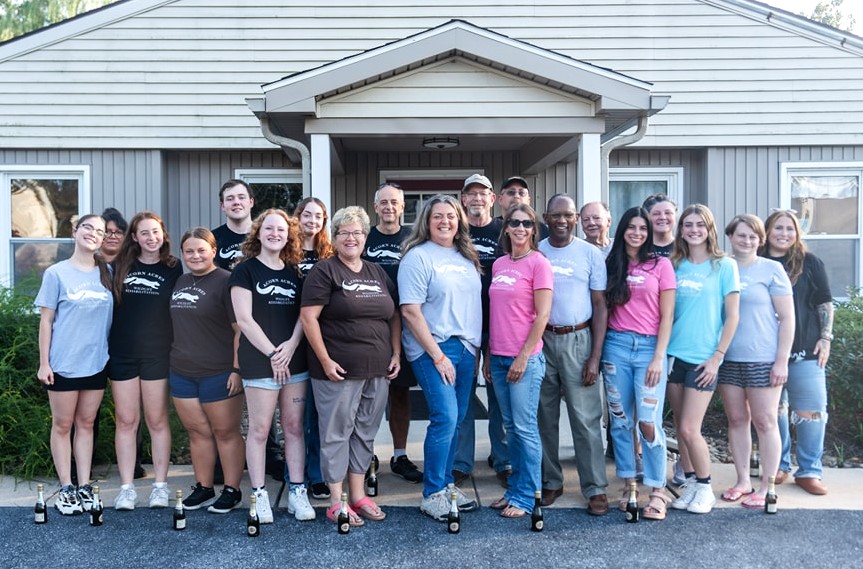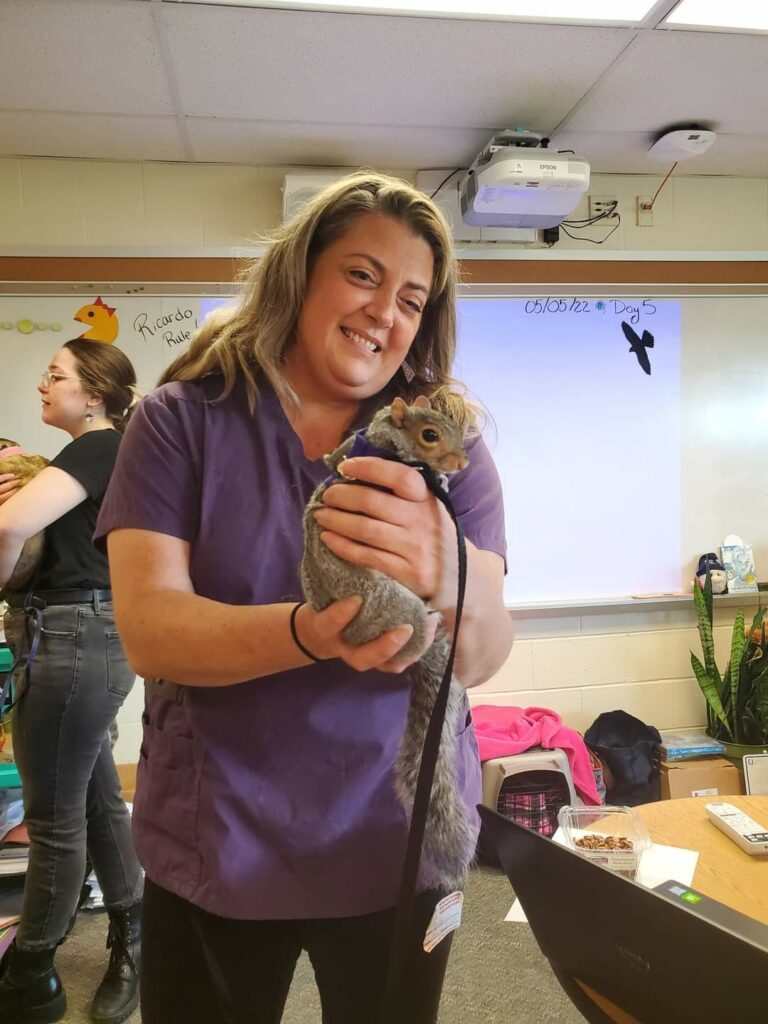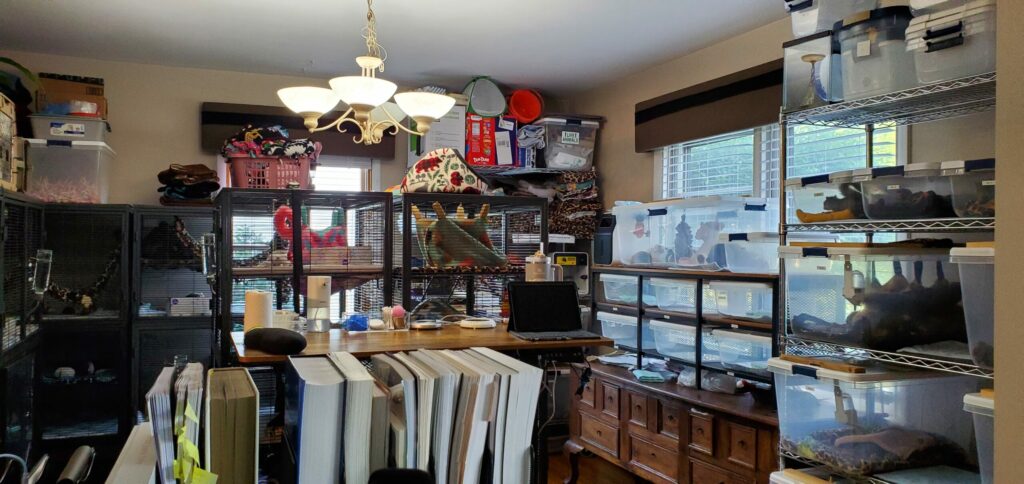Betsy Shank is well known throughout Lancaster County for her love of wild animals.
Shank is the founder and executive director of Acorn Acres Wildlife Rehabilitation, a nonprofit that specializes in caring for squirrels, groundhogs and other rodents.
Since 2021, Shank has operated Acorn Acres out of her Millersville home. That will change at the end of this month, when it is scheduled to move into the Pine Creek Animal Hospital’s former location at 2100 Stone Mill Road in Manor Township. The building became available for lease when the veterinary practice moved into larger quarters at the Lime Spring Square Shopping Center.

Pine Creek Animal Hospital owner Ashley Tuna and her husband, Ryan, own 2100 Stone Mill Road. They are partnering with Acorn Acres to facilitate its move and expansion.
The Acorn Acres team and a group of volunteers are currently remodeling the building, now named The Tuma Clinic. Besides the main space for the animals, there will be a front lobby and an education room. In all, the available space totals close to 2,000 square feet.
The expansion is sorely needed. More and more, she was having to turn animals away, Shank said.
So far in 2024, Acorn Acres has hosted 210 animals. That’s roughly on pace with 2023’s total intake of 271, which was double the intake of 2022. In all, Acorn Acres has helped more than 765 animals since opening its doors.
To pay for the renovations, the move and related expenses, the nonprofit launched a $50,000 capital campaign. As of mid-September, it was within $1,800 of its goal, Shank said.
A decade ago, Shank had been working in corporate accounting, with no thought of becoming a wildlife rehabilitator. Then, one day, everything changed.

On April 16, 2010, while riding her tractor in her backyard, she found a baby squirrel.
Thinking it was dead, she jumped to the rescue and discovered it was still alive.
She tended to it, picking parasites out of its fur, bathing it, and researching tips for care online. She named it “Milo.”
At first, Shank said, she “did so much wrong.” It took research and time to gain skills and experiences. After Milo had returned to full health, she released him.
“Nothing felt right anymore after he was gone,” Shank said.
The following spring, she received a phone call for five baby squirrels. They became known as the “Fuzzy Five.” She raised them in a cage in her backyard and released them once they were fully grown.
In April 2011, Shank left corporate America. To bring in money, she started sewing bedding for other wildlife rehabilitators, selling it online and at conferences.
“I traveled from the Mississippi east, and from Canada to Florida selling my fleece cage gear,” she said. “While doing that, I was aligning myself with rehabilitators, talking to them and learning their craft. I was teaching myself how to rehab from the best while making it my own.”
Eventually, Shank found herself in the care of 15 to 20 squirrels at a time. It was time to formalize what she was doing.
During the pandemic, she had been sewing cloth masks and selling them. With the money she made, she paid an attorney to help set up a nonprofit. Acorn Acres Wildlife Rehabilitation was officially registered in September 2020. Shank’s husband, Dave Aichele, serves as board president.
“If Covid hadn’t happened and I hadn’t made masks, I wouldn’t have had the funds to open Acorn Acres,” she said.
Meanwhile, Shank earned accreditation as a certified wildlife rehabilitator from the International Wildlife Rehabilitation Council. She is one of just two people in Pennsylvania with the qualification.
She also earned her state rehabilitation license, which involved securing sponsorship from a fellow rehabilitator, a veterinarian and permission from her municipality and putting in more than 200 hours of training and clinical work.
Her most famous patient to date is undoubtedly Poppy, a groundhog she rescued. Poppy appeared with Bill Murray in a 2020 Super Bowl commercial reprising Murray’s iconic “Groundhog Day” movie character.
Poppy died in February 2023; her role as Acorn Acres’ “animal ambassador” has been taken over by Elliott, a groundhog rescued in 2022.
Besides donation, Acorn Acres earns revenue through event appearances and education programs.

Crowded house
One United Lancaster recently visited Shank’s home. The setup is impressive — and also shows why it’s time to relocate.
In the dining room, a white board is posted near the doorframe containing the feeding schedule and diet for all the animals. Black wire cages are stacked on top of each other, neatly organized by species. Each cage contains colorful homemade bedding, a bowl of chopped up vegetables, a bottle for water, and room to roam around in.
An assortment of animals resides in each cage. They range from 10- to 12-week-old squirrels being bottle fed, 4-month-old squirrels, a small albino flying squirrel, several permanent animal residents, and a groundhog. Shank takes great pride in making a comfortable and safe place for the animals she is rehabilitating, and it shows.
The care of each animal is determined differently. While younger squirrels might have a heating pad in their living space to keep warm, more mature squirrels might require bigger crates outside Shank’s backyard to become introduced to the natural elements. Around 16 weeks, Shank begins the process of releasing her squirrels into the wild.
“I get to wake up every day and live my dream,” Shank said. “There aren’t a lot of people in this world who get to say that. …
“It’s been one hell of a ride. It’s not what I planned, but the community asked for it and I knew it was needed.”
(Editor’s Note: This story was updated Sept. 24 to correct the number of animals treated at Acorn Acres and several details of Shank’s career.)







